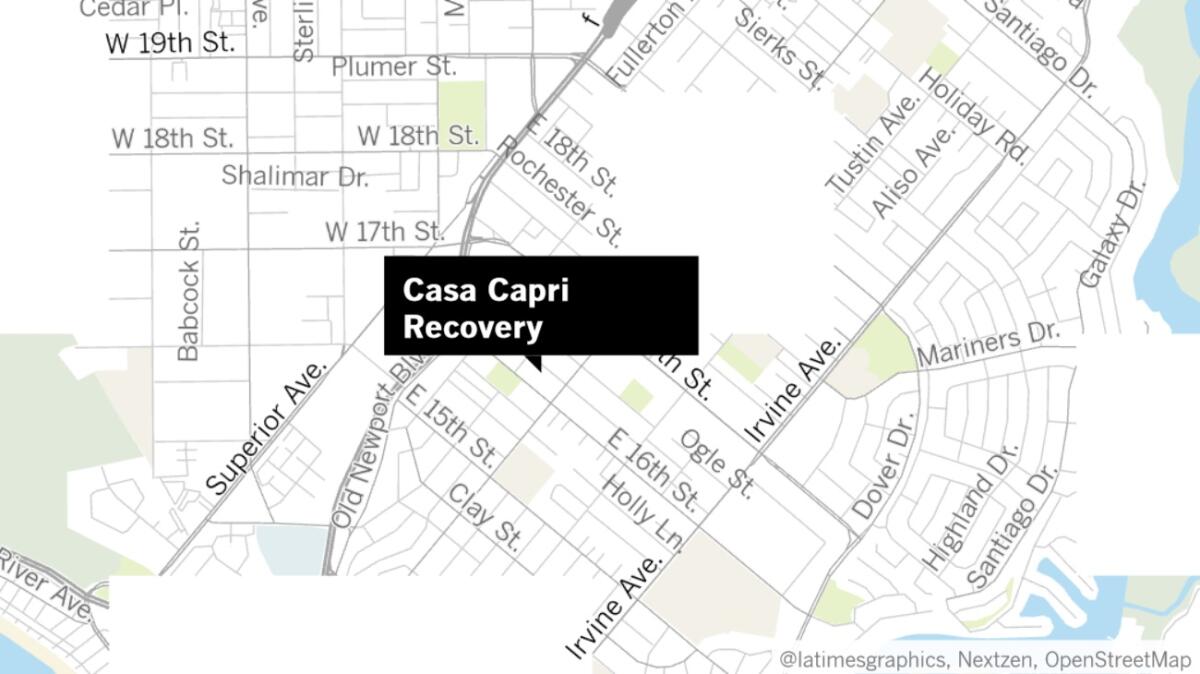Judge rules against sober-living home operator that challenged Costa Mesa regulations

- Share via
A federal judge has ruled against a sober-living home operator that sued Costa Mesa two years ago arguing that the city’s regulations on such facilities illegally discriminate against their residents.
U.S. District Judge James Selna, who presided over previous lawsuits involving sober-living homes and the city, granted summary judgment March 4 in the case involving Casa Capri Recovery.
“The court’s ruling once again validates Costa Mesa’s decision to adopt reasonable rules and push back against bogus lawsuits,” Mayor Katrina Foley said in a statement.
A Casa Capri employee referred all questions to its attorneys, who did not respond to requests for comment.
Casa Capri sued Costa Mesa in February 2018, alleging that the city’s group-home ordinances were illegal and discriminated against disabled people. Sober-living homes typically house people recovering from alcoholism and drug addiction, who are considered disabled under state and federal laws.
The lawsuit referred to two ordinances the City Council adopted in 2014 and 2015 that imposed new permitting requirements on sober-living homes and stipulated that they, other group homes and licensed alcohol and drug treatment facilities must be at least 650 feet from one another in residential areas.
Casa Capri, which was housing up to 28 women at 269 and 271 16th Place, had to apply for separate permits for its two properties, triggering the 650-foot buffer rule.
Casa Capri requested what it called a “reasonable accommodation” to be allowed to operate on the contiguous parcels, but the Planning Commission and City Council denied its permit applications in 2017.
Residents and officials expressed concern about the number of people living at Casa Capri and felt it was contributing to an overconcentration of sober-living facilities in the city.
The operator sued, and Costa Mesa then took Casa Capri to court in July 2018 in a bid to shut down the facilities on 16th Place, saying they remained open without required permits.
According to Casa Capri’s complaint, it had operated without incident at the adjoining properties for years, starting in 2011, “until it was swept up in [the] dragnet of the city’s official campaign against persons in recovery.”
Selna’s ruling hinged on the definition of “disabled.” Casa Capri argued that the definition includes alcoholics and drug addicts, according to court documents. But the city argued that not everyone in a rehabilitation program qualifies as disabled.
In the end, Selna was “persuaded by Costa Mesa’s analysis,” according to the ruling.
The ruling showed Casa Capri “failed to offer any evidence that the civil rights of its residents were violated by any conduct undertaken” by Costa Mesa, the city said in a news release.
The judge also did not find that the city engaged in retaliation by filing the action to shut down the homes being operated by Casa Capri, according to the ruling.
All the latest on Orange County from Orange County.
Get our free TimesOC newsletter.
You may occasionally receive promotional content from the Daily Pilot.




